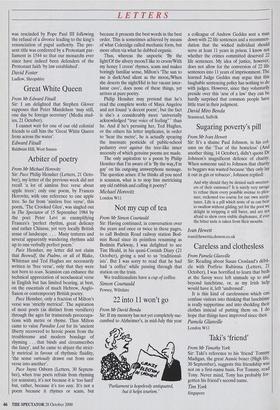Arbiter of poetry
From Mr Michael Horovitz Sir: Pace Philip Hensher (Letters, 21 Octo- ber), my letter of the previous week did not recall 'a lot of aimless free verse about apple trees'; only one poem, by Frances Horovitz, with one reference to one apple tree. So far from 'aimless free verse', this poem, 'The Crooked Glen', was singled out in The Spectator of 15 September 1984 by the poet Peter Levi as exemplifying Frances's 'perfect rhythm, great delicacy and rather Chinese, yet very locally British sense of landscape. . . . Many textures and several apparently wandering rhythms add up to one verbally perfect poem.'
Pate Hensher, my letter did not claim that Beowulf, the Psalms, or all of Blake, Whitman and Ted Hughes are necessarily written in 'free verse', only that they were not born to scan. Scansion can enhance the technical appreciation of neoclassical verse in English but has limited bearing, at best, on the essentials of much Hebrew, Anglo- Saxon or contemporary British poetry.
Pace Hensher, only a fraction of Milton's verse was 'strictly metrical'. The aspiration of most poets (as distinct from versifiers) through the ages far transcends preoccupa- tions with metre or rhyme. Thus Milton came to value Paradise Lost for its 'ancient liberty recovered to heroic poem from the troublesome and modern bondage of rhyming . . . that binds and circumscribes the fancy', and he came to abjure the strict- ly metrical in favour of rhythmic fluidity, `the sense variously drawn out from one verse into another'.
Pace Jayne Osborn (Letters, 30 Septem- ber), when true poets refrain from rhyming (or scansion), it's not because it is 'too hard' but, rather, because it's too easy. It's not a poem because it rhymes or scans, but because it presents the best words in the best order. This is sometimes achieved by means of what Coleridge called mechanic form, but more often via what he dubbed organic.
Thus, whereas the unpoetic 'By the light/Of the silvery moon/I like to croon/With my honey I croon' rhymes, scans and makes boringly familiar sense, Milton's 'The sun to me is dark/And silent as the moon,/When she deserts the night/Hid in her vacant inter- lunar cave', does none of these things, yet arrives at pure poetry.
Philip Hensher may pretend that he's read the complete works of Maya Angelou and not found 'a decent poem', but the fact is she's a considerably more 'universally acknowledged "true voice of feeling" ' than he. And if he's perusing her, Ted Hughes, or the others his letter implicates, in order to 'hear the metre', he is actually spraying the insensate pesticide of public-school pedantry over against the tree-like inner necessity of which genuine poems are made.
The only aspiration to a poem by Philip Hensher that I'm aware of is 'By the way,/I'm gay' on his outgoing answerphone message. The question arises: if he thinks all you need is scansion, what is to stop him metricising any old rubbish and calling it poetry?
Michael Horovitz
London W11


























































































 Previous page
Previous page